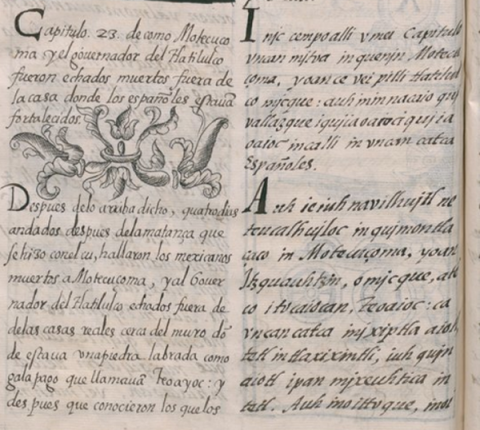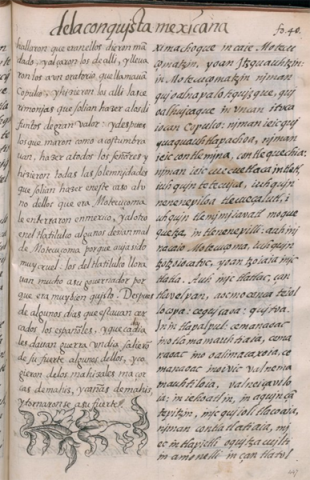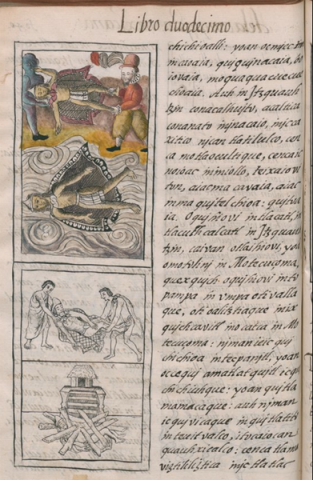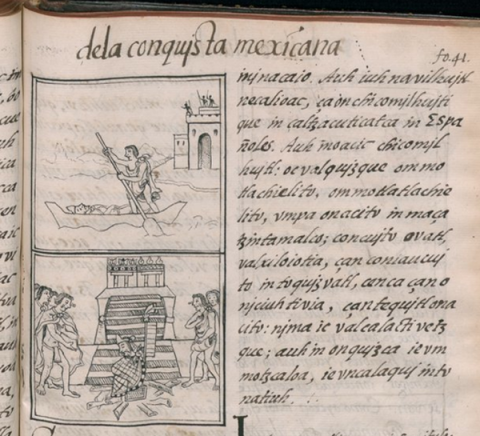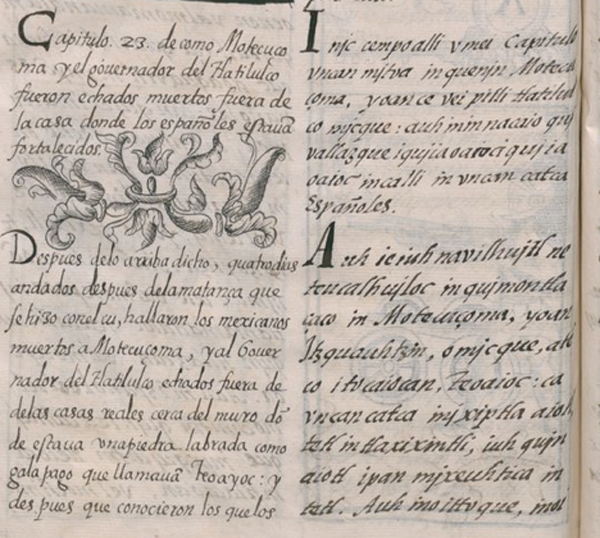 |
[Transcription of the Nahuatl (right-hand column) by James Lockhart:]
[f. 39v., cont.] Inic cempoalli vmei Capitulo vncan mitoa in quenin Motecuçoma, yoan ce vei pilli tlatilulco micque: auh ininnacaio quivallazque iquiiaoaioc* in calli in vncan catca Españoles.
Auh ie iuh navilhuitl neteucalhuiloc in quimontlaçaco in Motecuçoma, yoan Itzquauhtzin, omicque, atēco itocaiocan, Teoaioc: ca vncan catca in ixiptla aiotl, tetl in tlaxixintli, iuhquin aiotl ipan mixeuhtica in tetl.
Auh in oittoque, in oi
----------
*IQUIIAOAIOC. The word is inadvertently repeated in the manuscript.
|
[Translation of the Nahuatl (right-hand column) by James Lockhart:]
Twenty-third chapter, where it is said how Moteucçoma and a great nobleman of Tlatelolco died, and the Spaniards threw their bodies out at the entry way of the house where they were.
Four days after people had been cast down from the temple, [the Spaniards] removed [the bodies of] Moteucçoma and Itzquauhtzin, who had died, to a place at the water’s edge called Teoayoc [Place of the Divine Turtle], for an image of a turtle was there, carved in stone; the stone represented a turtle.
And when they were seen
[Translation of the Spanish (left-hand column) by James Lockhart:]
Chapter Twenty-three, of how Moteucçoma and the governor of Tlatelolco were thrown dead outside the house where the Spaniards were fortified.
After the above-said, four days after the killing at the cu, the Mexica found Moteucçoma and the governor of Tlatelolco dead, thrown outside the royal palace close to the wall where there was a stone carved like a tortoise that they called Teoayoc.
After those who found them recognized
|
[Translation of the Nahuatl into Spanish by Fr. Bernardino de Sahagún; transcription of the Spanish (left-hand column) by James Lockhart:]
[f. 39v., cont.] Capitulo .23. de como Motecuçoma y el gouernador del Tlatilulco dueron echados muertos fuera de la casa donde los españoles estauā fortalecidos.
Despues de lo arriba dicho, quatro dias andados despues de la matança que se hizo con el cu, hallaron los mexicanos muertos a Motecuçoma, y al Gouernador del Tlatilulco echados fuera de* las casas reales cerca del muro dōde estaua vna piedra labrada como galapago que llamauā Teoayoc:
y despues que conocieron los que los
----------
*DE. The word is inadvertently repeated in the manuscript.
|
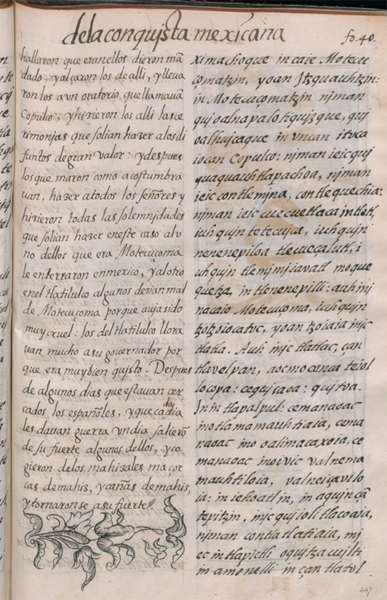 |
[Transcription of the Nahuatl (right-hand column) by James Lockhart:]
[f. 40r.] ximachoque in ca ie Motecuçomatzin, yoan Itzquauhtzin: in Motecuçomatzin niman quioalnapalotiquizque, quioalhuicaque in vncanitocaiocan Copulco: niman ie ic quiquaquauhtlapachoa, niman ie ic contlemina, contlequechia: niman ie ic cuecuetlaca in tletl, iuhquin tetecuica, iuhquin nenenepiloa tlecueçalutl, iuhquin tlemimiiavatl moquequetza, in tlenenepilli: auh in inacaio Motecuçoma, iuhquintzotzoiocatoc, yoan tzoiaia inic tlatla.
Auh inic tlatlac, çan tlavelpan, aocmo cenca teiollocopa: cequi caoa: quitoa. Inin tlapalpul: cemanaoac inotlamamauhtiaia, cemanaoac in ooalimacaxoia, cemanaoac in o ivic valnemamauhtiloia, valneiçaviloia: in iehoatl in, in aquin çā tepitzin, inic quiiolitlacoaia, nimancontlatlatiaia, miec in tlapictli oquitzacuilti in amo nelli in çan tlatol
|
[Translation of the Nahuatl (right-hand column) by James Lockhart:]
and recognized as Moteucçoma and Itzquauhtzin, they hastened to take up in their arms and brought him to the place called Copolco. Then they placed him on a pile of wood and set fire to it, ignited it. Then the fire crackled and roared, with many tongues of flame, tongMoteucçomaues off lame like tassels, rising up. And Moteucçoma’s body lay sizzling, and it let off a stench as it burned.
And when it was burning, some people, enraged and no longer with good will, scolded at him, saying, “This miserable fellow made the whole world fear him, in all the world he was dreaded, in all the world he inspired respect and fright. If someone offended him only in some small way, he immediately disposed of him. He punished many for imagined things, not true, but just fabricated tales.”
[Translation of the Spanish (left-hand column) by James Lockhart:]
who they were, they gave orders to have them removed and took them to an oratory that they called Copolco. There they performed for them the ceremonies customary for the dead of great reputation. Afterward they burned them as they customarily did all the lords, and performed all the ceremonies that they usually performed in such cases. One of them, Moteucçoma, they buried in Mexico, and the other in Tlatelolco.
Some spoke ill of Moteucçoma because he had been very cruel.
The people of Tlatelolco mourned their governor greatly because he was very well liked.
After the Spaniards had been surrounded for several days, and every day they offered them battle, one day some of them sallied forth from their fort and collected from the maize stands ears and stalks of maize, then returned to their fort.
|
[Translation of the Nahuatl into Spanish by Fr. Bernardino de Sahagún; transcription of the Spanish (left-hand column) by James Lockhart:]
[f. 40r.] hallaron que eran ellos dieron mādado, y alçaron los de alli, y llevaron los a un oratorio que llamauā Copulco, y hizieronlos alli las cerimonias que solian hazer a los difuntos de gran valor: y despues los quemaron como acostumbrauan, hazer a todos los señores y hizieron todas las solemnidades que solian hazer en este caso al vno dellos que era Motecuçoma le enterraron en mexico, y al otro en el tlatilulco.
algunos dezian mal de Motecuçoma porque auia sido muy cruel:
los del tlatilulco llorauan mucho a su gouernador porque era muy bienquisto.
Despues de algunos dias que estauan cercados los españoles, y que cada dia les dauan guerra vn dia salierō de su fuerte algunos dellos, y cogieron de los mahizales maçorcas de mahiz, y cañas de mahiz, y tornaronse a su fuerte.
|
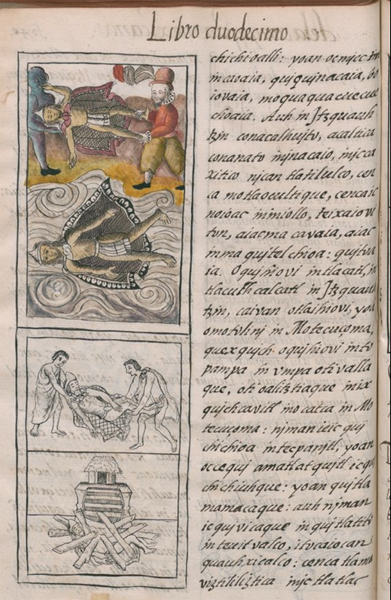 |
[Transcription of the Nahuatl (right-hand column) by James Lockhart:]
[f. 40v.] chichioalli: yoan oc miectin in caoaia, quiquinacaia, ôoiovaia, moquaquacuecuechoaia.
Auh in Itzquauhtzin conacalhuito, acaltica conanatoin inacaio, inic caxitico nican tlatilulco, cenca motlaocultique, cenca icnoioac in iniollo, teixaioviton, aiac ma cavaia, aiac in ma quitelchioa: quitoaia. Oquihiovi intlacatl, in tlacuchcalcatl in Itzquauhtzin, ca ivan otlaihiovi, yoā omotolini in Motecuçoma, quexquich oquihiovi in topampa in vmpa otivallaque, otioalitztiaque inixquich cavitl in ocatca in Motecuçoma: niman ie icquichichioa in tecpanitl, yoan oc cequi amatlatquitl icquichichiuhque: yoan quitlamamacaque: auh niman icquivicaque in quitlatito in teuitvalco, itocaiocan: quauhxicalco: cenca tlamaviztililiztica inic tlatlac
|
[Translation of the Nahuatl (right-hand column) by James Lockhart:]
And there were many others who scolded him, moaning, lamenting, shaking their heads.
But Itzquauhtzin they put in a boat; they took his body in a boat until they got him here to Tlatelolco. They grieved greatly, their hearts were desolate; the tears flowed down. Not a soul scolded him or cursed him. They said, “The lord Tlacochcalcatl Itzquauhtzin has suffered travail, for he suffered and was afflicted along with Moteucçoma. What tribulations he endured on our behalf in the past, during all of Moteucçoma’s time!” Then they outfitted him, equipping him with the lordly banner and other items of paper, and they gave him provisions. Then they took him and burned him in the temple courtyard at the place called Quauhxicalco. It was with great splendor that his body
[Translation of the Spanish (left-hand column) by James Lockhart:]
(intentionally blank)
|
[Translation of the Nahuatl into Spanish by Fr. Bernardino de Sahagún; transcription of the Spanish (left-hand column) by James Lockhart:]
[f. 40v., tres dibulos; sin texto en español]
|
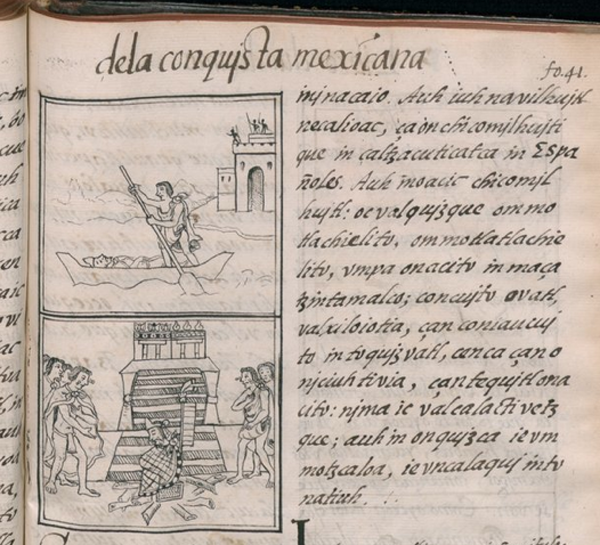 |
[Transcription of the Nahuatl (right-hand column) by James Lockhart:]
[f. 41r.] in inacaio.
Auh iuh navilhuitl necalioac, ça onchicomilhuitiquein caltzacuticatca in Españoles. Auh in oacic chicomilhuitl: oc valquizque ommotlachielito, ommotlatlachielito, vmpa onacito in maçatzintamalco; concuito ovatl, valxiloiotia, çan coniaucuito in toquizvatl, cenca çan on iciuhtivia, çan tequitl onacito: nima ic valcalactivetzque;maize leaves as one does in war, going in great auh in onquizca ie vmmotzcaloa, ie vncalaqui in tonatiuh.
|
[Translation of the Nahuatl (right-hand column) by James Lockhart:]
was burned.
After four days of fighting, for seven days the Spaniards were just enclosed in the house. But when the seven days were past, they came back out for a while to take a look, looking around here and there; they went as far as Maçatzintamalco. They gathered stalks of green maize, beginning to form ears. They just gathered the maize leaves as one does in war, going in great haste. Hardly had they got where they were going when they quickly went back into the building. When they had come out the sun was already off to one side, about to set.
[Translation of the Spanish (left-hand column) by James Lockhart:]
(intentionally blank)
|
[Translation of the Nahuatl into Spanish by Fr. Bernardino de Sahagún; transcription of the Spanish (left-hand column) by James Lockhart:]
[f. 41r., dos dibujos; sin texto en español]
|
